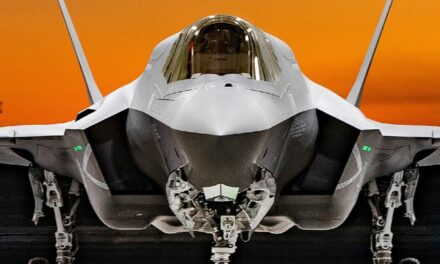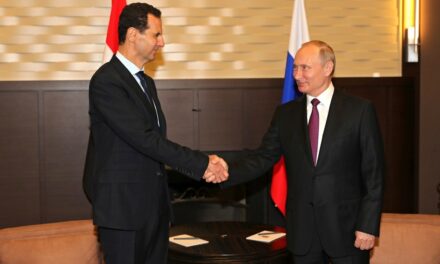We support our Publishers and Content Creators. You can view this story on their website by CLICKING HERE.
With the fall of Syrian dictator Bashar al-Assad, conventional wisdom says Russia has suffered a strategic defeat. After all, Russian President Vladimir Putin has been Assad’s chief backer. But is it possible we have actually just witnessed a geo-strategic defeat for Putin?
Unfortunately no, at least not yet.
History of Being Saved by Putin
In 2015 Putin saved Assad from an eminent fall and expanded Russia’s military presence in Syria, all to project power against Europe, the Middle East, and Africa.
Syria quickly turned into a key hub of military logistics operations in these regions, and with it, Russia’s authority in the region continued to grow. The Middle East has come to see Russia as a great power and, in turn, to view the West as irresolute. That dynamic began to change when Russia chose to prioritize Ukraine rather than save its client in Damascus, persuading Assad to flee Syria instead.
Assad is out, but Russia is not. The fate of Russia’s military bases remains unclear, but at the time of this writing, there is no indication that a complete military exit is certain. In fact, according to Russian Deputy Foreign Minister Mikhail Bodganov, Russia is engaged in “constructive” talks with Hayat Tahrir al-Sham (HTS), the Islamist rebel group that led a coalition that ousted Assad and is holding power. According to Bogdanov, the talks are aimed at confirming Russia’s military presence.
“The bases were there at the request of the Syrian authorities with the goal of fighting terrorists and ISIS,” he said, “I assume everyone agrees that the fight against terrorism and what remains of ISIS isn’t over.”
HTS, for its part, has some interest in building a relationship with Moscow and putting aside previous rivalries with Russia. The Kremlin could grant HTS recognition at a time when Western governments hesitate (albeit for valid reasons). Indeed, Moscow has been doing the same thing with the Taliban in Afghanistan.
Even if Russia were to lose its military bases, it remains a permanent member of the UN Security Council and a co-signatory to the one document that outlines a process for Syria’s political transition, UN Resolution 2254. Even with the overthrow of the brutal dictator backed by Moscow, Russia retains a seat at the diplomatic table and remains a force for shaping Syria’s future.
Moscow is engaged in a global fight. From Putin’s standpoint, this is nothing less than an existential battle to reshape the West’s influence. Russia’s invasion of Ukraine highlights this reality and underlines the price Putin is willing to pay for it. Syria has always been part of this bigger picture to redraw Russia’s dominance in the Middle East and Europe. Russia needed a military and political presence in Syria, located on the strategically vital Eastern Mediterranean. It also needed a friendly regime that ensured these interests. Even with Assad gone, Russia still maintains both.
Show of Force, But Victory?
Backing Assad’s brutal regime was never really about Syria but about wielding the power and influence sustained by continuing conflict with the West, wherever it arises. As Boris Bondarev, Russia’s diplomat who resigned in protest of the Ukraine invasion, explained, from Putin’s perspective, the war in Ukraine is “the culmination of an epic and eternal confrontation between an independent Russia and its eternal enemy, the West led by the United States.”
Putin’s priority is winning the war in Ukraine, but what does winning mean? As military analyst Anders Puck Nielsen notes, it is not about holding territory as many in the West believe. It is about keeping Ukraine destabilized so that it remains vulnerable to Russian influence. Russia certainly spared no expense for this war, but even Russia’s resources have their limits.
Amidst speculation of what Trump’s plan for Ukraine may look like, along with a potential ceasefire, the year 2025 may prove decisive. If Russia pushes the West toward a peace settlement on its terms, Putin wins. Those terms would exclude security guarantees for Ukraine, which would open the door for Russian influence in the country’s politics, potentially even installing leadership friendlier to Russia. Russia also seeks relief from Western sanctions, relief it could use to again build strength for later attacks on Ukraine. That would be destabilizing for the West and further open the door to Russian military actions elsewhere.
Winning in Ukraine for Putin doesn’t just mean validation of Russian power, but a green light to push even further against Western interests. If Russia keeps a presence in Syria while sanctions are lifted – as some U.S. lawmakers are already pushing – it may create additional openings for Russian influence in post-Assad Syria.
The West’s Influence Peddling
The question for the U.S. is whether it will take advantage of the opening the toppling of Assad represents. If the West allows Ukraine security guarantees that guard against further Russian efforts at destabilizing the country, it would be a clear victory for the West and a loss for Vladimir Putin’s plans throughout the Middle East, further diminishing Putin’s reputation.
Vladimir Putin. Image Credit: Russian Government.
The U.S. can work to strengthen the counter-narrative of Russia as a great power reshaping the Middle East. It can begin countering the disinformation growing in the Middle East that the U.S. is becoming a diminished power in the world and highlight that the Russia-Iran alliance only brings war and instability. The U.S. can actively work to diminish Russia’s influence by aligning with European and Arab capitals to push for a Western-led diplomatic process on Syria. The U.S. can stay engaged with Syria’s new leadership – whatever it may look like – as a reminder of the difference between a power that backs a war criminal in Syria and one that does not, a point the U.S. should actively highlight as part of countering Russian disinformation. It also has to stay committed to Ukraine and ensure that any ceasefire gives Ukraine firm security guarantees to keep Ukraine stable.
No darkness lasts forever. Assad’s fall shows that. And Russia can still lose. But make no mistake. The U.S. can only impact the future of the Middle East by staying engaged.
About the Author: Anna Borshchevskaya
Anna Borshchevskaya is a senior fellow at the Washington Institute for Near East Policy and author of Putin’s War in Syria: Russian Foreign Policy and the Price of America’s Absense.

 Conservative
Conservative  Search
Search Trending
Trending Current News
Current News 





